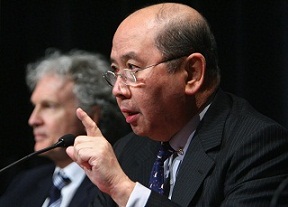Day: June 23, 2011
South China Sea issue
Former Secretary of Foreign Affairs
It seems that the situation in the South China Sea is taking a turn for the worse. The increasingly harsh rhetoric is now being backed by a display of muscle. China sent one of its most modern surveillance vessels on a run through the South China Sea from Guangzhou to Singapore. The Philippines sent its largest – and apparently only – warship, a WWII vintage destroyer, on patrol through waters it now calls the West Philippine Sea. Vietnam and China have each conducted live-fire exercises while the U.S. and ASEAN navies have just completed their annual joint naval exercise. This war of words and saber-rattling, if not handled properly, can lead to a situation that would complicate and even make it impossible for a diplomatic solution to be reached.
(With these developments, now I am terrified at the prospect at having him (Domingo Lee) represent our interest during these crucial times. I do not mean to denigrate the nominee’s intellect or age. I just think his abilities and past experience are not suited for this particular post)
One Message/One Voice
That is why it is important for the Philippines to speak with one voice and by that I mean not just one message but one person aside from the President. The cacophony of conflicting voices – some defiant and inflammatory, others clearly betraying ignorance of the nuances of international relations – from officials in the executive to the provincial level, not well versed in the art of diplomacy and geopolitics, risks escalating tensions.
Senator Ponce Enrile was right to caution the President’s subalterns from speaking on the issue and calling for the Department of Foreign Affairs to do the talking. Enrile said not only is the “tough talk” unproductive, it might paint the President in a corner, since it is now the President’s office speaking.
The President speaking on the issue, through the Foreign Secretary, is the wisest course of action to take. Fortunately, this advice is being heeded. Foreign Secretary Albert del Rosario’s sober presentation of the Philippine case and of advancing a “rule of law” approach to settle the dispute is just the right tone. Getting the envoys of six ASEAN member states in Manila to issue a statement calling for a peaceful resolution of the dispute was helpful even if largely symbolic. It reinforces our call for the multilateralization of the issue. While on one level this may give us greater leverage than if we were to negotiate this bilaterally, it also makes eminent sense because there are other claimants who are ASEAN members themselves as well as non-claimants who nevertheless have significant stake in the state of affairs in this busy shipping lane through which more than a quarter of world commerce passes.
Other Stakeholders
These stakeholders include the United States, Japan, Korea, Singapore and Indonesia among others. The U.S. had declared that freedom of navigation of the South China Sea is in its national interest. Japan and Korea have their own territorial dispute with China aside from the fact that its trade with Asia and Europe go through these disputed waters. Singapore has urged China to be more open about the extent of its territorial claims in the South China Sea, saying Beijing’s ambiguity was causing international concern. As a trading nation, Singapore’s interest is in preserving freedom of navigation in these waters.
Even far away Australia has expressed its agreement with the position of the Philippines that international law, particularly the United Nations Convention on the Law of the Sea (UNCLOS), should be the basis for settling territorial disputes in the South China Sea. Indeed many countries outside the region have made it known that they have a stake in the peaceful settlement of the dispute. Each stakeholder has its national interests to promote and it would be useful to determine if there are areas where these intersect with each other. Finding such common ground can serve as the foundation for a solution to the dispute.
Track II Dialogue
These developments make it all the more imperative to have a Track II dialogue in place, such as the one being organized by the Carlos P. Romulo Foundation and the Institute of South East Asian Studies (ISEAS) in October. The goal is to give clarity to publicly stated government positions, surface the underlying issues beneath them and identify areas of common interest. From this hopefully can proceed cooperation that will lead to a win-win solution for all concerned. And even if long term solutions are not within reach, at least ground rules can be established and interim measures can be put in place.
Let me illustrate how this can be possible. The basis for each claimant’s position is one area where clarity would be helpful in showing possible pathways for eventual resolution. For example, China claims all the islands in the Spratly’s (based on a map drawn in 1947 by the then Nationalist Government of China) enclosed by undefined and unconnected nine dotted lines or bars. The legality and the precise locations indicated by those lines are not clear because there was no definition of those dotted lines, nor were their co-ordinates stated. It was not clear whether the intent was to claim just the islands or the entire South China Sea since in those days, there was no internationally recognized legitimate reason to claim waters beyond three miles offshore.
In any event, China now seems to claim the entire area but without so explicitly stating and even welcoming joint exploration and development, hinting at a possible compromise possibly as a consequence of its closer examination of international law and its desire to assure its neighbors of its commitment to its “peaceful rising”.
A greater understanding and appreciation for the underlying motives of each claimant’s position is also crucial. Looking at China again in particular, its motives are clearly economic, strategic and political in nature. It behooves all stakeholders to understand and appreciate these if they are to reach a common ground with China. The potential for marine and mineral resources are understandable.
The political maybe a little nuanced. The scheduled change of leadership in 2012, pressure from the People’s Liberation Army, domestic social issues arising from migrant workers, unequal income distribution and ethnic tensions all play a part in China’s territorial assertiveness. The strategic interest of China in control of the South China Sea is not so apparent as to strike a sympathetic chord from our side of the fence. However, they do have legitimate concerns when they view the Straits of Malacca as a potential choke point to their access to the Indian Ocean and the oil fields of the Middle East. Addressing these strategic concerns may shed light on possible cooperative action such as joint maritime security arrangements.
Discussing these issues in a formal government to government setting would be difficult and unproductive because each participant would not have had the benefit of internal discussions and would have to stick to publicly held positions. A Track II mechanism, however would serve to prime more constructive dialogue at the official level.
Qualified Philippine Ambassador
All of these developments are moving at lightning pace while we dilly dally with the appointment of our country’s ambassador to Beijing amidst doubts about his physical condition and his capability to take on such a demanding assignment. I have made no secret about my lack of confidence in the reported nominee to the post.
With these developments, now I am terrified at the prospect at having him represent our interest during these crucial times. I do not mean to denigrate the nominee’s intellect or age. I just think his abilities and past experience are not suited for this particular post. The Commission on Appointments with the likes of elder statesmen Juan Ponce Enrile and Miriam Defensor as members should be able to enlighten the rest of the members of the fitness of the nominee with just a few probing and incisive questions.
(This article is RRR’s June 22, 2001 column in the Philippine Star.)
My Life as an Undocumented Immigrant
From the Washington Post Ombudsman on why they didn’t use Vargas’ confession story:http://www.washingtonpost.com/opinions/why-did-the-post-deport-jose-antonio-vargass-story/2011/06/24/AGdXKdjH_story.html
(Jose Antonio Vargas is a former reporter for The Washington Post and shared a Pulitzer Prize for coverage of the Virginia Tech shootings. He founded Define American, which seeks to change the conversation on immigration reform.)
By Jose Antonio Vargas
New York Times
My mother wanted to give me a better life, so she sent me thousands of miles away to live with her parents in America — my grandfather (Lolo in Tagalog) and grandmother (Lola).
After I arrived in Mountain View, Calif., in the San Francisco Bay Area, I entered sixth grade and quickly grew to love my new home, family and culture. I discovered a passion for language, though it was hard to learn the difference between formal English and American slang. One of my early memories is of a freckled kid in middle school asking me, “What’s up?” I replied, “The sky,” and he and a couple of other kids laughed. I won the eighth-grade spelling bee by memorizing words I couldn’t properly pronounce. (The winning word was “indefatigable.”)
Click here for the rest of the story.
Still I’m paranoid

Still I’m paranoid


